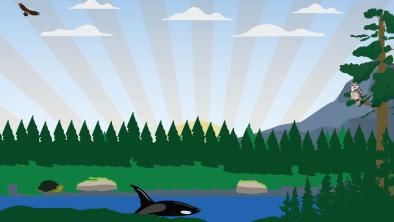The Wilderness Committee presents at TRU on the tactics of protection
TRU Omega

Protecting the environment is a difficult task. It’s one of the reasons why we have so many non-governmental organizations spring up with protection as their mandate. The Wilderness Committee, an organization which was founded in 1980, believes that the key to making a difference is citizen support and political advocacy.
Two members from the Wilderness Committee, Gwen Barlee and Isabelle Groc, gave a talk at TRU on Thursday, Feb. 27 about how they are attempting to raise awareness of environmental issues and show what the Wilderness Committee is.
“The primary reason that wilderness committee was created was the type of logging that was happening in British Columbia in the 1960s, ‘70s, ‘80s and even into the ‘90s,” said Barlee, policy director for the Wilderness Committee. “It was just devastating.”
Barlee was the primary speaker for the talk. She made a move from working in the film industry in Vancouver, where she worked 18-hour days on shows such as the X-Files, to a 13-year relationship with the Wilderness Committee.
With 60,000 members, the group is the largest environmental NGO in Canada. They are active in the protection of the environment through both scientific research and political activism. According the Barlee, the members are key to their success.
“They aren’t just listening to the Wilderness Committee,” Barlee said. “They’re also listening to the will of 60,000 people.”
"It’s really important for our students to hear a lot of different viewpoints and a lot of different approaches to environmental issues,” said Karl Larsen, TRU professor of environmental science. “This is a great example of another group that involves science to some extent but feels there are other ways that are more powerful.”
One of the other ways the organization believes to be a better approach to environmental issues is the legal system.
“We don’t want to do it, but we do do it,” Barlee said. “We engage in lawsuits, and increasingly we’ve been taking the federal government to court over species at risks.”
The Wilderness Committee recently took the government to court over being years behind on the creation of recovery strategies for multiple at-risk species along the Enbridge pipeline.
The organization has a longstanding relationship with students, and part of the reason they were speaking at TRU was a recruiting campaign seeking student involvement. The lecture was attended by roughly 30 people, mostly students.
“I learned a lot about the Wilderness Committee and the type of work that they’re doing,” said Sarah McArthur, a student in the masters of environmental science program. “I think it’s really important for British Columbia and I think we need a little more awareness in Kamloops of these issues.”
Photo: Thompson River Valley. Gerry Paille via Flickr.


